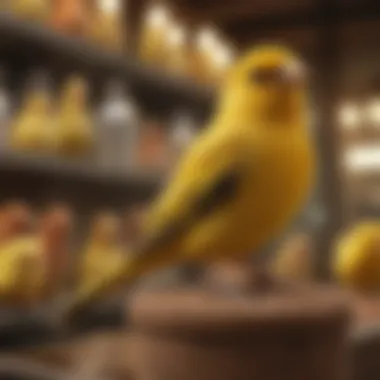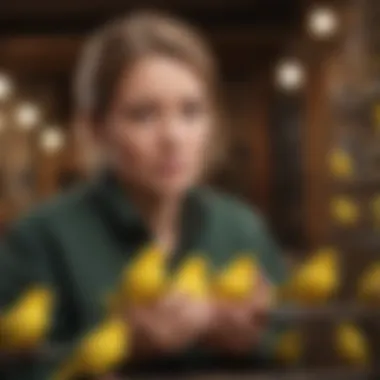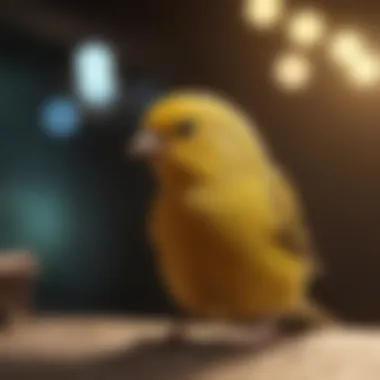Where to Buy Canary Birds: A Comprehensive Guide


Intro
When considering the acquisition of canary birds, potential owners face various options. Understanding where to buy canaries extends beyond just location; it encompasses the importance of acquiring these pets from reputable sellers. This guide explores the spaces available for purchasing canaries while considering the crucial element of the birds' welfare.
Buying a canary is an investment in companionship, song, and vibrant color. However, knowing the best places to find a healthy canary and understanding their specific needs is paramount. As enthusiasts, safeguarding the health and happiness of these delicate creatures is a top priority, making thorough research essential. Before diving into buying, prospective canary owners must familiarize themselves with what running an aviary truly involves.
Avian Care Basics
Owning a canary involves various responsibilities that ensure their well-being. Knowing the basic aspects, including nutrition, habitat setup, and hygiene, is crucial to ensuring they thrive.
Importance of Proper Nutrition
Canaries require a balanced diet to maintain their health. Their primary food source typically consists of seed blends designed specifically for canaries. In addition to seeds, it’s beneficial to provide fresh fruits and vegetables, which supply necessary vitamins. Important options include leafy greens, carrots, and even a small amount of cooked egg for a protein boost. Ensuring adequate hydration is equally essential, thus offering fresh water daily is critical.
Understanding Bird Species and Their Needs
Canaries come in varied breeds, each with its own characteristics. For example, different canaries have distinct singing abilities. Knowing a specific breed's needs helps set realistic expectations about interactions and sounds. Moreover, some canaries are more sociable, while others may not enjoy too much handling.
Basics of Birds Habitat Setup
A well-set-up habitat contributes greatly to a canary's quality of life. A spacious cage with the right dimensions is necessary to allow canaries to move freely. The cage should include perches, toys, and hiding places. Applying appropriate substrate at the bottom can facilitate cleaning while keeping the habitat pleasant. Multicolored toys engage their mind, preserving cardiovascular health through play.
Grooming and Hygiene Tips
Regular grooming and maintenance of hygiene are vital elements in canary care. Bathing canaries is part of their routine, as it keeps their feathers healthy. Offering shallow dishes with water lets them bathe naturally. It’s also best to keep the cage clean, ensuring a safe environment. Regular checks on the bird's nails also assist in proper care, providing comfortable perching.
Interacting with Your Pet Bird
Building trust between humans and birds promotes healthy relationships. An understanding of canary behavior helps owners grasp the natures of their pets and accommodates their needs.
Building Trust and Connection
Establishing a bond requires time. Moving slowly and calmly around the cage can help the bird adjust. Using treats is effective in encouraging approaching from the canary, strengthening their trust toward you. Remember to speak softly yet consistently near them.
Training Techniques and Tips
Investing time in training can yield rewarding outcomes. Simple commands and routines establish groundwork for interaction, enhancing the pet experience. Encouraging the bird to come out and explore may boost confidence in their environment.
Fun Activities for Bird Owners and Their Birds
Engagement is essential, and canaries often respond to music and toys. Owners may find satisfaction in singing along to popular melodies and observing as canaries mimic sounds. An excellent way to spend time together is by allowing their pets to flutter in a safe, contained area.
Recognizing Bird Cues and Behaviors
Observing canaries can reveal their needs and emotions. Perching quietly or fluttering about can suggest they are content, while rapid movements or loud calls could indicate distress. Noting these cues aids overall health management.
Emotional Well-Being of Birds
The psychological aspect of pet ownership should not be overlooked. Understanding a canary’s emotional state impacts their overall health and longevity.
The Role of Play and Socialization
Playtime is essential for canaries. Many enjoy interactive toys and playthings. Group habitats can also afford social birds the companionship from a similar species.
Enhancing Birds' Emotional Health
Regular interaction with owners fosters emotional bonds. Merely spending time talking or sharing a relaxed atmosphere contributes positively. The sense of security and social engagement impacts emotional health significantly.
Assessing Bird Stress and Remedies
Knowing signs of stress and changes in a canary's demeanor can prevent escalation. Common signs include excessive screaming or aggressive behavior. Addressing potential issues involves evaluating environment changes, social factors, or other stressors that could disturb their peace.
Building Strong Human-Bird Bonds
Active participation in a canary's life broadens trust and understanding. Reward-based interactions deepen this bond as trust replaces fear.


Bird Health and Safety
Keeping a canary healthy indicates thoughtful ownership. Being proactive about health safeguards enhances longevity.
Common Health Issues and Prevention
Canaries may experience issues such as respiratory infections and feather damage. Recognizing these problems means assessing their habitat, outside interactions, and available resources regularly enables swift action in terms of veterinary intervention. Best practice includes monitoring eating habits for signs of deeper issues.
Routine Veterinary Care
Regular veterinary check-ups promote health and settle potential infestations or diseases before they become systemic. Finding an avian vet is highly recommended, as they specialize in bird health.
Environmental Hazards to Avoid
Household plants like azalea and lily may threaten canaries if ingested. Keeping hazardous substances out of confinement reduces the risks. Maintain cleanliness in their vicinity, ensuring no toxins linger to explore. Avoid letting them flutter near open windows that risk escape.
Signs of Illness or Distress
Recognizing warning signs is essential to prompt action. Symptoms like a change in appetite, lethargy, or an unusual position indicate possible health problems needing attention from a professional.
Fun Facts and Quirky Insights
Highlighting unique traits and insights into canaries can add to their mystique and engagement factor.
Unique Traits of Popular Bird Species
Some canary breeds are closely noted for their vocal talents. Their diverse coloration contributes to their allure in aviculture.
Historical and Cultural Significance of Birds
Birds, including canaries, often appear in various cultures and literature settings. They symbolize freedom and creativity through song and flight.
Famous Bird Owners and Their Stories
Numerous historical figures found joy with canaries, using their melodious traits to embellish daily surroundings with tunes, relieving tension perhoaps. Notable singer canary bonds can showcase feathered companions with fluidity in handling among audiences.
The intent of this guide is to furnish insights into smart purchasing and proper canary care while recognizing its intrinsic value as a living creature that enhances emotional vibrancy.
Foreword to Canary Birds
Canary birds, known for their exquisite melodies and vibrant plumage, hold a unique place in the world of pet ownership. Understanding these birds is essential for any prospective owner. This section addresses not only their. provenance but also what makes them a preferred bird pet.
Origin and Characteristics
Canary birds originated from the Canary Islands, which are part of Spain. They were first domesticated and bred for their vibrant colors and appealing songs. Varieties of canaries have developed over centuries through selective breeding.
The two main types of canaries known today are singing canaries and color canaries. Singing canaries, like the Yorkshire and English Fancy, are valued for their vocal range and melodious tunes. Color canaries, such as the Satinette and Gloster, are bred primarily for their striking color patterns.
In general, adult canaries range between 4 to 8 inches in length. Their lifespan can extend to around 10 years or more with proper care.
Notably, canaries display a remarkable range of colors including yellow, orange, and white. Their gentle and docile nature makes them suitable for various living environments, provided socialization and safeguarding are maintained. Understanding these characteristics helps owners create a nurturing atmosphere that promotes well-being and enjoyment.
Why Choose a Canary Bird
Opting for a canary often derives from various motivations. One reason is their enchanting ability to sing. For many, the melodious tones echoing in the home bring a sense of serenity and happiness.
Moreover, canaries require relatively less maintenance compared to other birds. Their straightforward dietary and habitat needs make them suitable for first-time bird owners.
Conservation of Space is also vital in urban environments. Canary birds are compact pets that adapt well to smaller living spaces, making them ideal for apartment dwellers.
It's important, however, to ensure that your motivations align with providing a suitable habitat and ample attention. By choosing a canary, you welcome companionship, enjoyment, and a singular experience in avian life.
When contemplating a canary bird as a pet, consider both their origin and charm, fostering understanding for their unique nature. Choosing the right bird often enhances the overall enjoyment of bird ownership.
Understanding Your Options
Choosing where to buy a canary bird is a critical step in becoming a responsible pet owner. This section aims to explore efficacy behind different purchasing options. Each choice has its complexities and merits. It is vital to evaluate each one to find the best fit for both your needs and the well-being of the bird.


Local Pet Stores
Benefits of Buying from Pet Stores
Buying canaries from local pet stores can be quite beneficial. These stores often provide convenience that many buyers appreciate. For instance, they offer a tactile experience where potential owners can observe the bird’s behavior in person. Many pet stores care deeply for the pets they sell. They ensure that the pets presented are kept in clean and stable environments. Additionally, local shops frequently provide basic advice on initial care and can also direct buyers to local vet services.
Drawbacks of Pet Store Purchases
However, one must consider the potential drawbacks. The pet store selection can vary. Sometimes, the birds might not be of the highest quality or health. Understanding the sources of the birds is often murky. Some birds are from mass breeders focused on turnover rather than welfare. As such, careful questioning regarding their breeding and care is necessary to ensure a sound purchase.
Breeders
Identifying Reputable Breeders
When exploring the option of breeders, finding reputable ones is critical. A well-established breeder typically provides details regarding the background and health of their canaries. Transparency is an essential feature here. A clear understanding of the breeding lineage and any health issues is vital. Research is necessary to identify breeders with solid reputations, as this guarantees healthier birds and breeds rituals. A good sign is breeders who actively participate in bird clubs. They often commit to ethical breeding standards.
Advantages of Buying from Breeders
One of the biggest advantages of going through breeders is the detailed knowledge they possess about their birds. They not only sell older canaries, which may have already established temperaments, but they often can help potential owners select based on their specific preferences. This personalized approach allows them to match birds according to the owner’s lifestyle and conditions, providing a distinct benefit.
Online Platforms
How to Navigate Online Bird Sales
online platforms for purchasing canary birds provides workflows that can save time and also broaden choices. Sellers offer a range of species and specific breeds, often accompanied by pictures and descriptions. To effectively navigate online purchases, it helps to use reputable platforms that focus on pets. Traditional online marketplaces, while tempting, may not provide adequate animal welfare insight.
Assessing Credibility of Online Sellers
Throughout online shopping, being able to assess the credibility of online sellers is crucial. Points to evaluate include seller reviews, seller terms of care, and return policies. Previous buyers often share experiences that can provide clues about the bird's health and well-being. Bird selling forums can be helpful resources, and engaging with these communities on red.it or facebook.com can illuminate sellers’ reputations.
Animal Shelters and Rescue Organizations
The Value of Adoption
Adopting from shelters is an underappreciated avenue for obtaining canaries. The value offered goes beyond just economics, as many birds in shelters desperately need loving homes. Shelters conduct health checks and temporary housing, ensuring that the birds are adaptively ready for a new environment. Canaries that have faced hardships in previous environments often become devoted companions. By adopting, owners grant these birds a new lease on life while also living similarly fulfilling lives themselves.
Considerations for Adopted Birds
However, adopting canaries requires thoughtful considerations. New owners must evaluate the unique behaviors often present, possibly due to past traumas. Be mindful that adjusting to new homes may take extra time and patience. Adopted birds may display distinct needs compared to a pet store or breeder’s profiles, requiring a sensitive approach toward their new environment. Cooperation with shelter staff can provide insights to facilitate wise decisions after adoption.
Factors to Consider Before Purchase
When considering a canary bird, multiple factors play a critical role in ensuring that the purchase aligns with both the bird’s needs and the owner’s expectations. Understanding these factors helps prospective owners appreciate the responsibilities that come with bird ownership, leading to more informed decisions.
Health Condition
Evaluating the health condition of a canary is paramount before purchasing. Healthy birds display lively behaviors, have clear eyes, and show no signs of lethargy. Potential owners should look for any visible ailments, such as feather plucking or difficulty breathing.
Regular veterinary check-ups are essential. Some sellers may provide guarantees about health conditions, but buying from a reputable source makes a significant difference. Establishing rapport with avian veterinarians before purchase is wise. They can help identify signs of common canary illnesses, making sure the selected bird is free from exceptional problems. Healthy birds lead to more enjoyable companionship, as they will be more energetic and engaging.
Age and Sex of the Bird
Another crucial point is understanding the age and sex of the bird. Young canaries require more socialization, as they are in their formative phase. Older birds may be easier to manage but often come with established habits that can be harder to change. When selecting a bird, assurance about its age from the seller is valuable information.
Sex can also impact socialization and breeding options. Male canaries, especially, are known for their melodious singing, while females are typically quieter. Established characteristics tied to sex play into what kind of experience an owner desires. Buyers should communicate interests clearly with sellers for ideal matches.
Socialization and Temperament
Each canary has its unique temperament. Some birds might be more timid while others are lively and curious. Understanding a canary's socialization requirements can be just as important as assessing its health. A well-socialized bird will generally respond better to human interaction, making it a more amicable pet.
Owners should note that canaries thrive best in environments where they can interact peacefully with people and other pets. Apart from individual temperament traits, the bird’s previous experiences will shape its future behavior. Affected birds may require more time and patience to adjust.
Cost Considerations
Assessing costs is vital. The financial burdens should include not just the purchase, but the ongoing care necessary for canaries. Let's take a deeper look.


Initial Costs
Initial costs comprise several elements: purchase price, cage setup, and necessary accessories like feeders, toys, and perches. Prices for canaries may vary widely. Young or uncommon breeds can incur tougher costs while typical ones like the American Singer Variety are more affordable. Finding quality supplies matters as it influences the health and well-being of the bird.
Only looking for the cheapest option might tempt buyers, but striking a balance between cost and quality is in everyone’s interest.
Long-Term Financial Commitment
Considering the long-term financial commitment is equally important. Expenses accumulate in the categories of food, vet care, and habitat enrichment over a canary's life span of around five to fifteen years. It is vital to maintain proper feed,
Regular costs can include high-quality bird seeds, fresh fruits, vegetables, and annual vet visits. Owners should prepare for unforeseen medical expenses as well. Keeping a budget helps monitor ongoing costs more precisely and helps avoid financial strain from ownership. Consistency breeds better pet care.
After Purchase: Care and Environment Setup
After securing a canary, the next critical phase involves establishing a suitable environment, understanding their dietary needs, and fostering social connections. This part of the process is pivotal not only for ensuring the physical health of your new pet but also for aiding in their emotional well-being. An enriched and safe environment, accompanied by proper care, profoundly impacts the adaptation of a canary to its new home. Let us delve into the essential elements every canary owner must consider.
Habitat Requirements
Creating an appropriate habitat is fundamental for your canary's well-being. Selecting an appropriate cage size is essential; it must allow for space to fly. A cage of a minimum of 24 inches wide and 18 inches high is recommended for one canary. Ensure that the bars are no wider than ½ inch to prevent escape or injury.
Key Considerations for Habitat Setup:
- Cage Location: Keep the cage in a quiet area where they can feel secure but also enjoy some natural light. Avoid direct sunlight to prevent overheating.
- Perches: Install perches of varying diameters to promote foot health. Use natural wood materials, as these promote exercise and mimic a more natural environment.
- Accessibility: Ensure that feeding and watering containers are easy to access for refills while minimizing stress for the bird.
- Maintenance: Keep the cage clean to prevent soot, dirt, and bacteria buildup. This is vital for the health and hygiene of your canary. A disheveled space and unchecked waste can lead to health problems.
Regular breathing fresh air is also important. If possible, allow the canary supervised time outside their cage in a safe, enclosed space. Through these necessary considerations, you can build a habitat that readily supports your feathered friend.
Diet and Nutrition
An optimal diet is crucial for maintaining canaries' vibrancy and health. While they typically thrive on seed mixes, a varied diet contributes significantly to their overall nutrition.
Recommended Dietary Components:
- Seeds: High-quality seed mixes tailored for canaries form the basis of their diet. Ensure the mix is fresh, without preservatives or added chemicals. Brands like Kaytee and Harrisons offer trusted seed mixes.
- Fresh Fruits and Vegetables: Introducing fresh produce rich in vitamins will benefit your birds' immune system. Some suitable options include leafy greens, carrots, and apples. Always wash fruit and vegetables thoroughly before feeding them to your canary.
- Grains: Cooked grains like quinoa or millet provide additional energy and enrichment.
Avoid processed foods and highly sugary snacks, as these can disrupt digestion and overall health. Monitor your canary's eating habits. Weight gain or loss can indicate potential health issues, thus parameterizing attention to their dietary intake is very important.
Socialization and Bonding
The psychological enrichment of a canary often hinges on social interaction. These birds can remain relatively solitary; nonetheless, they benefit immensely from bonding both with their owners and possibly even other birds.
Building a Relationship with Your Canary:
- Daily Interaction: Spend time each day near the cage, speaking softly or whistling to familiarize them with your presence. This gradually builds trust, paving the way for more direct engagement.
- Out-of-Cage Time: Allowing them supervised time outside the cage reinforces your connection. This practice also promotes play, exercise, and natural behaviors.
- Training Steps: Employ simple commands during interactions. Positive reinforcement, such as healthy treats, buttons, slow claps or praises can further develop trust.
Regular social interaction and a sense of companionship are critical components to keeping your canary happy, leading to a fulfilling relationship for both owner and bird. In effect, the care after buying a canary sets the stage for an enriching and positive experience for all involved, ensuring your bird thrives in its new environment.
In summary, investing effort into the after-purchase care of your canary not only fosters a healthy bird but also paves the way for deeper connections and more satisfying companionship. Visit websites like reddit.com or facebook.com groups dedicated to pet bird ownership for advice and community support in your journey.
The End
Buying a canary bird is a significant commitment that entails careful consideration and due diligence. In this article, we have explored various avenues of acquiring canaries, emphasizing the importance of understanding both the well-being of the birds and the needs of potential owners. Shortcuts in this process can lead to mismatches that affect not only the new pet but also the owner's experience.
It is crucial to reflect on the various options: pet stores, breeders, online platforms, and animal shelters or rescue organizations. Each source offers distinct benefits and some potential drawbacks. For instance, pet stores often provide immediate access to birds but don’t guarantee the best health practices. In contrast, reputable breeders generally focus on breeding healthy stock but may require more scrutiny from potential buyers
Additionally, considering the factors detailed earlier, which range from health conditions to long-term costs, is vital. Evaluation of the bird's socialization, behavior, and adaptability will ultimately dictate the success of your new pet integration into your home. Choosing wisely will enhance your enjoyment and ensure a flourishing relationship between you and your new companion.
By understanding these decisive elements, future canary owners can make informed decisions that contribute to the well-being of the bird while simultaneously enriching their own lives.
Final Thoughts on Purchasing a Canary
Acquiring a canary is not merely about selecting a pet; it is about creating a learning experience and environment where both owner and bird can thrive as partners. When done thoughtfully, introducing a canary into your life can lead to many positive experiences. Understanding an individual bird's requirements and personality can foster deeper connections.
Maintaining a healthy and stimulating environment serves as the foundation for a vibrant life for your canary. Acts such as regularly changing the diet, ensuring social interaction, and providing the appropriate habitat are critical for ensuring that the bird remains engaged and stress-free. Evaluating personal readiness for such responsibilities might also encourage potential owners to reflect on long-term contributions to their chosen canaries.
Establishing a bond can take time. Owners should be patient and consistent as they allow their new pets to adapt. Individuals should learn her unique sounds and behaviors—as these can express a multitude of different feelings. Paying attention facilitates discerning what your bird desires or may require holistically.
Resources for New Canaries Owners
To help new canary owners navigate the intricacies of keeping a bird, several resources are available for better support:
- Avian veterinarians: Professional specialists who can offer advice on health and regular maintenance. Look for local listings or ask fellow bird owners in communities such as Reddit.
- Bird interest groups on Facebook: Participating in conversation threads offers insights from seasoned owners about social strategies, feeding, or general care. Follow groups focused specifically on canaries for relevant discussions.
- Books and magazines: There are many print and digital publications dedicated to canaries and birds in general. Consulting literature ensures a broader understanding and a range of strategies.
- Instructional videos on platforms like YouTube: Visual repositories exhibit proper care techniques, habitat setups, and training. However, it is important to vet the reliability of sources to avoid misinformation.
Remember, becoming a good canary owner is an ongoing journey that combines education, practice, and a compassionate understanding of these lively creatures. Take your time to explore these resources and cultivate knowledge that supports both you and your bird.















